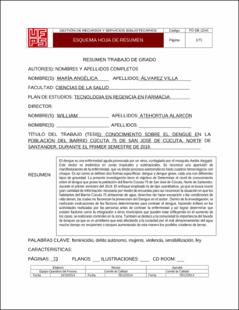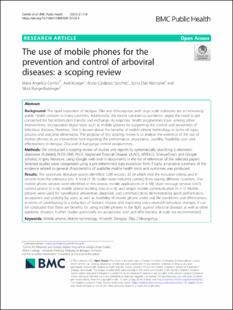Listar por tema "Dengue"
Mostrando ítems 1-4 de 4
-
Aedes aegypti control in breeding sites through an insecticidal coating with dual effect: Laboratory trials and safety assessment
(Medical and veterinary entomologyReino Unido, 2024-10-22)Ground water tanks are known to be preferred Aedes aegypti oviposition places providing opportunities for adult and larvae control. Therefore, a dual-effect insecticidal coating (IC) (alphacypermethrin/ pyriproxyfen) with ... -
Conocimiento sobre el dengue en la población del barrio Cúcuta 75 de san José de Cúcuta, Norte de Santander, durante el primer semestre de 2019.
(Universidad Francisco de Paula SantanderFacultad de Ciencias de la SaludSan José de CúcutaTecnología en Regencia de Farmacia, 2019)El dengue es una enfermedad aguda provocada por un virus, contagiado por el mosquito Aedes Aegypti. Este vector es endémico en zonas tropicales y subtropicales. Se reconoce una aparición de manifestaciones de la enfermedad, ... -
The use of mobile phones for the prevention and control of arboviral diseases: a scoping review
(BMC Public HealthReino Unido, 2021-01-09)Background: The rapid expansion of dengue, Zika and chikungunya with large scale outbreaks are an increasing public health concern in many countries. Additionally, the recent coronavirus pandemic urged the need to ... -
WhatsApp-based intervention in urban Colombia to support the prevention of arboviral diseases: a feasibility study
(Pathogens and global healthInglaterra, 2024-05-24)Arboviral diseases remain a significant health concern worldwide, with over half the world's population at risk for dengue alone. Without a vaccine or targeted treatment, the most effective strategy of prevention is vector ...













